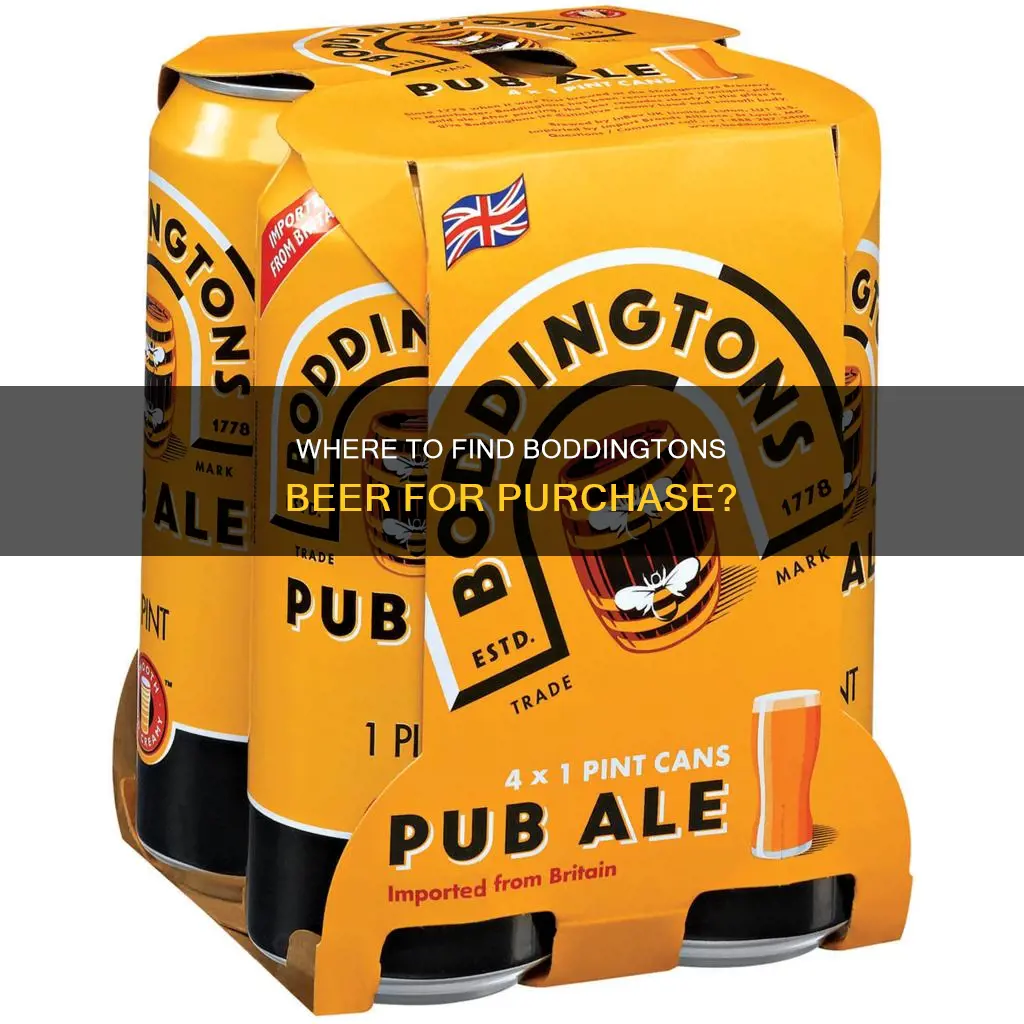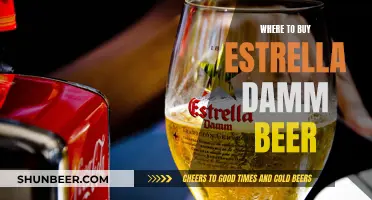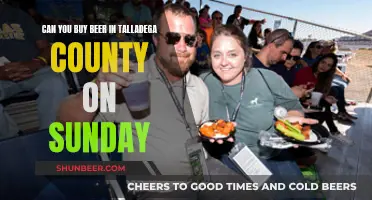
Boddingtons is a golden bitter beer that was originally produced in Manchester, UK. It was one of the first beers to be packaged in cans containing a widget, giving it a creamy draught-style head. The beer was heavily marketed in the 1990s as The Cream of Manchester, which helped raise the profile of the city. It was sold to Whitbread in 1989, which expanded its distribution nationwide. It was then sold to Interbrew (now AB-InBev) in 2000, which moved production out of Manchester in 2004. Since then, its sales have dropped significantly. While it is still available in some places, it has become harder to find, especially outside major metropolitan areas.
What You'll Learn

Boddingtons Pub Ale availability in the USA
Boddingtons Pub Ale is a higher ABV version of Boddingtons Draught Bitter, brewed since 1993 for export markets. It was available in the United Kingdom from 1995–1996 as Boddingtons Export. It is also sold in the UK under the label "Manchester Gold".
The Boddingtons brand was acquired by Whitbread in 1989, which gave the bitter nationwide distribution and an increased marketing budget. Boddingtons achieved its peak market share in 1997 and was exported to over 40 countries. Interbrew (now AB-InBev) acquired the Whitbread Beer Company in 2000.
The Strangeways Brewery, where Boddingtons was originally brewed, was closed in 2004 and production of pasteurised (keg and can) Boddingtons was moved to Samlesbury in Lancashire. Production of the cask-conditioned beer moved to Hydes Brewery in Moss Side, Manchester, until it was discontinued in 2012, ending the beer's association with the city.
In 2010, it was speculated that InBev (now known as Anheuser-Busch InBev) would attempt to sell the Boddingtons brand to another brewer after its failed attempt to sell the UK rights to Bass ale. In 2010, Boddingtons was the sixth-highest selling bitter in the United Kingdom, although sales had dropped by almost three-quarters since the takeover by Anheuser–Busch InBev in 2000.
In 2017, Anheuser–Busch InBev announced that it was launching a digital, social, PR and video campaign for Boddingtons featuring Melanie Sykes, who had appeared in adverts for the brand in 1997.
Boddingtons Pub Ale is still available in the USA, but it may be harder to find outside of major metropolitan areas. It can be purchased in Pennsylvania and Virginia from beverages2u.com, and it was recently available in Colorado and outside of Washington, DC.
Online Beer Buying Guide: England's Best Brews Delivered
You may want to see also

Boddingtons Pub Ale availability in the UK
Boddingtons Pub Ale is a higher ABV version of Boddingtons Bitter, brewed for export markets. It has been enjoyed by beer drinkers in England for more than 200 years and is well known for its creamy head and smooth body. It is a refreshing, smooth beer with a golden colour, full-bodied flavour, and malty, moreish taste.
Boddingtons Pub Ale is available in the UK, where it was first introduced in 1995-96 as Boddingtons Export. It is brewed by the Budweiser Brewing Group UK&I, which is owned by the global brewer Anheuser-Busch InBev. InBev acquired the Whitbread Beer Company, which owned the Boddingtons brand, in 2000.
In 2010, Boddingtons was the sixth-highest selling bitter in the United Kingdom, although sales had dropped by almost three-quarters since the takeover by Anheuser-Busch InBev in 2000. In 2011, AB InBev's UK president, Stuart MacFarlane, claimed that the company still believed in the brand, despite not advertising it for five years.
Contract brewing of Boddingtons Cask continued until March 2012 when production of the beer ended. Production was around 250,000 hectolitres in 2012, with around 80% of production destined for the UK market and the remaining 20% for export markets such as Taiwan, Singapore, and the United Arab Emirates.
Best Places to Buy a Keg of Beer
You may want to see also

Boddingtons Brewery history
Boddingtons Brewery, also known as Strangeways Brewery, was founded in 1778 by two grain merchants, Thomas Caister and Thomas Fry, in Manchester, England. It was initially called Caister & Fray.
In 1832, Henry Boddington joined the brewery as a travelling salesman. By 1848, he had become a partner, and in 1853, he borrowed money to become its sole owner. Under his leadership, the brewery's output increased tenfold from 1853 to 1877, making it Manchester's largest brewery and one of the largest in the North of England.
After Henry Boddington's death in 1886, his son, William Slater Boddington, became company chairman. The company went public in 1888, becoming known as Boddingtons Breweries Ltd. By 1892, the company owned 212 public houses, making it the twelfth-largest tied estate in the United Kingdom.
In 1900, Boddingtons was one of the breweries implicated in the English beer poisoning epidemic, where over 6,000 people were poisoned by arsenic-tainted beer, resulting in more than 70 deaths.
The Boddington family continued to be involved in the company throughout the early 20th century, with Henry's youngest son, Robert Slater Boddington, overseeing the installation of a bottling hall in the 1920s. Robert's sons, Philip and Charles, served as joint chairmen after their father's death in 1930.
During World War II, the brewery water tanks were hit by bombs during the Manchester Blitz in 1940, leading to a temporary closure. The brewery was rebuilt with modern equipment, including stainless steel brewing vats, making it the first in Europe to have them.
In the 1960s, the company faced a hostile takeover bid from Allied Breweries, but Whitbread stepped in, increasing its stake in the company and preserving its independence. By the 1980s, Boddingtons had expanded its pubs outside of Manchester and acquired several local breweries.
In 1989, the Boddington family sold Strangeways Brewery and the Boddingtons brand to Whitbread for £50.7 million. Whitbread transformed the brand from regional to national, significantly increasing production and exports.
In 2000, the Whitbread Beer Company was acquired by the Belgian brewer Interbrew (later known as InBev), which led to further changes in ownership and production moves. In 2004, InBev announced plans to close the Strangeways Brewery, and production was shifted to other locations in Lancashire and Wales, ending the beer's association with Manchester.
Despite some efforts to revitalise the brand, sales declined, and by 2012, production of the cask-conditioned beer ended. While Boddingtons beer is still available, its association with Manchester and its cult following have faded.
Buying Beer in Ellisville, Mississippi: What's the Deal?
You may want to see also

Boddingtons advertising campaigns
Boddingtons' advertising campaigns have been credited with raising the profile of Manchester, with some even suggesting that the brand's "Cream of Manchester" campaign transformed the city. The campaign, which ran from 1991 until 1999, was created by ad agency Bartle Bogle Hegarty and featured beautiful women with Mancunian accents and a series of print and television advertisements that emphasised the creaminess of the beer. The campaign was so successful that it led to Boddingtons becoming one of the city's most famous products, alongside Manchester United and Coronation Street.
The "Cream of Manchester" tagline was a play on words, referring not only to the creamy head of the beer but also to Manchester being a "hive of industry". The campaign featured a distinctive colour scheme of yellow on black, and a variety of British icons synonymous with creaminess, such as ice cream and face cream. One of the most famous television advertisements in the campaign featured a glamorous couple on board gondolas on Manchester's River Irwell, parodying a well-known ice cream advertisement.
The campaign was so influential that it launched the career of Melanie Sykes, who first found fame as a "Boddies girl" in the 1990s. In 2017, she returned to promote the beer 21 years after her original appearance in the campaign.
Prior to the "Cream of Manchester" campaign, Boddingtons had largely eschewed above-the-line advertising. Their first television advertisements, which aired in the North West of England in the late 1980s, featured the comedian Frankie Howerd.
Buying Beer at Madison Student Union: What You Need to Know
You may want to see also

Boddingtons sales and ownership history
Boddingtons Brewery was founded in 1778 by Thomas Caister and Thomas Fry, two grain merchants, under the name Strangeways Brewery. In 1832, Henry Boddington joined the venture as a travelling salesman, and by 1848 he had become a full partner in the operation. In 1853, Boddington borrowed money to become the brewery's sole owner, and by 1877 had increased its output from 10,000 barrels a year to 100,000 barrels a year. In 1886, Henry died and his son, William Slater, took over the business, which was by then known as Boddingtons Breweries Ltd.
Throughout the first quarter of the 20th century, Boddingtons continued to be the largest brewery in Manchester and one of the largest breweries in all of northern England. In 1940, during World War II, the brewery suffered a direct hit from a bomb onto its water tanks during the Manchester Blitz. When it was rebuilt, the new brewery featured the first stainless steel brewing vats in Europe.
A household name in Northern England, Boddingtons had by 1995 increased its production to 850,000 barrels a year. What started as a regional English ale has today become a British staple and international delight, enjoyed by discerning drinkers on both sides of the Atlantic.
In 1989, Whitbread bought Boddingtons Brewery and gave its bitter nationwide distribution and an increased marketing budget. Boddingtons achieved its peak market share in 1997 and, at the time, was exported to over forty countries. Interbrew (now AB-InBev) acquired the Whitbread Beer Company in 2000.
In 2004, the owners (now known as InBev) announced plans to close the Strangeways Brewery and move most production from Manchester to Magor in South Wales and Samlesbury, Lancashire, with the loss of 60 jobs. Boddingtons cask ale production, which accounted for less than 10% of output, was moved to Hydes Brewery in Moss Side. Production ended in 2005 and the brewery was demolished in 2007.
In 2010, it was speculated that InBev (known as Anheuser-Busch InBev from 2008 onwards) would attempt to sell the Boddingtons brand to another brewer after its failed attempt to sell the UK rights to Bass ale. The Times was critical of what it perceived as InBev's mismanagement of the brand, which had "declined" since the closure of the Strangeways Brewery in 2005.
In 2010, Boddingtons was the sixth-highest selling bitter in the United Kingdom, although sales had dropped by almost three-quarters since the takeover by Anheuser-Busch InBev in 2000. In 2011, AB InBev's UK president Stuart MacFarlane claimed, "We still believe in the brand", while admitting to not advertising the brand for five years. Contract brewing of Boddingtons Cask continued until 2012 when production of the beer ended.
Production was around 250,000 hectolitres in 2012, with around 80% of production destined for the UK market and around 20% for export markets such as Taiwan, Singapore and the United Arab Emirates.
Where to Buy Schlitz Beer Today?
You may want to see also
Frequently asked questions
Yes, you can still buy Boddingtons beer in the UK. It is now owned by AB-InBev and produced at their brewery in Samlesbury, Lancashire.
It seems that Boddingtons beer is available in some US states, including Pennsylvania, Virginia, and Massachusetts. However, some sources indicate that it may be difficult to find outside major metropolitan areas.
You can find Boddingtons beer for online purchase at abcfws.com and beverages2u.com.







